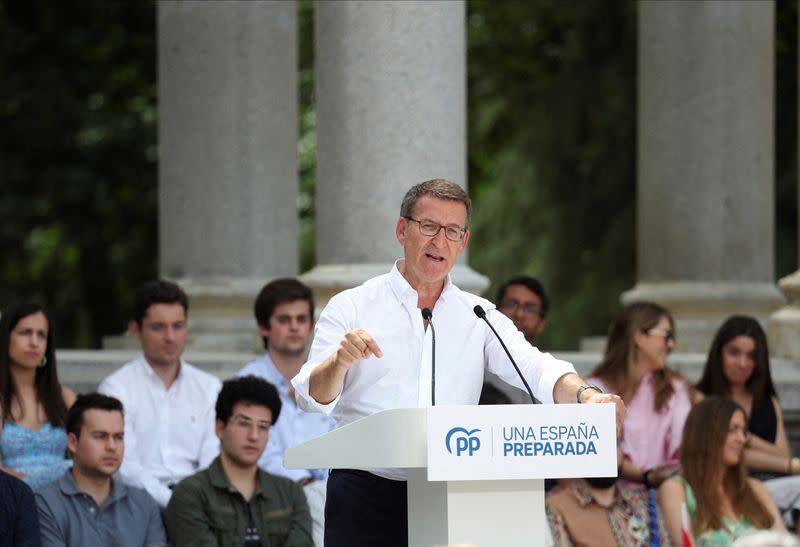Spain's opposition urges Socialists to help avoid coalition with far right

MADRID (Reuters) - The frontrunner for next month's Spanish election said on Monday he did not hold out much hope of striking a deal with the ruling Socialists to avoid having to form a coalition with the far right to run the country.
Polls ahead of the vote on July 23 suggest the centre-right People's Party led by Alberto Nunez Feijoo will win the most seats but will fall short of a majority and may need to govern in coalition with the far-right Vox.
Feijoo said his party had proposed to the Socialists they each support the party with the most votes to form governments without the need for a coalition in the recent regional and pending national elections "but the answer was no".
"The Socialists will make deals with anyone but the PP," he said at an event in Madrid.
The prospect of deal-making between Spain's two major parties, who traditionally ruled alone with alternating majorities until 2016, has increasingly come into focus as the vote approaches.
A poll by 40DB published by El Pais on Monday projected the PP could win between 128 and 142 seats in the 350-member lower house. An alliance between the PP and Vox, seen garnering between 37 and 41 seats, would exceed the 176 seat absolute majority needed to rule.
The Socialists, who have ruled in coalition with far-left parties since 2019, could get between 99 and 109 seats.
Vox is anti-Muslim, anti-feminist and opposes Spain's political system of devolved government.
Socialist Prime Minister Pedro Sanchez on Monday described Feijoo's comments as an "exercise in cynicism", pointing out that the PP agreed to coalition governments with Vox in several regions and cities where his party had the most votes.
Independent analyst Miguel Angel Murado said the PP was seeking to portray itself as "a reasonable party ... in favour of shunning extremes".
But there have been examples of such cooperation.
The Socialists will govern Barcelona after the PP agreed to support his investiture. The candidate of the pro-independence Junts per Catalunya party had been favourite to become mayor until the 11th-hour deal.
The Socialists also allowed the PP's Mariano Rajoy to form a minority government in 2016 by agreeing to abstain in a confidence vote, ending a 10-month deadlock.
(Reporting by Charlie Devereux; Editing by Alison Williams)

 Yahoo News
Yahoo News 
